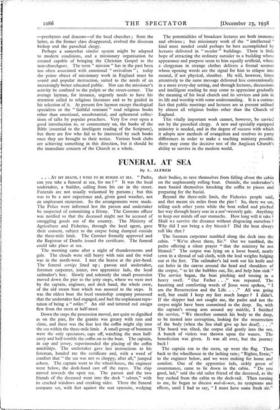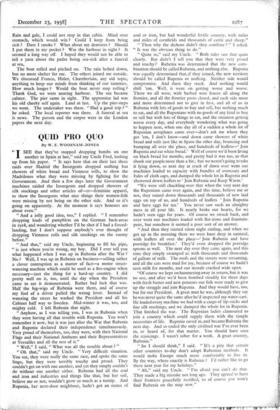FUNERAL AT SEA
By L. ALFRED
. . . AT MY DEATH, I WISH TO BE BURIED AT SEA. " Padre, can you take a funeral at sea, for me ? " It was the • local undertaker, a builder, calling from his car in the street. Funerals are not usually welcomed by parsons ; but this was to be a new experience and, given good weather, not an unpleasant excursion. So the arrangements were made. The Police were informed lest the parson and undertaker be suspected of committing a felony. The Customs officer was notified so that the deceased might not be accused of smuggling goods out of the country. 'The Ministry of Agriculture and Fisheries, through the local agent, gave their consent, subject to the corpse being dumped outside the three-mile limit. The Coroner formally approved and the Registrar of Deaths issued the certificate. The funeral could take place at sea.
The morning came after a night of thunderstorms and gale. The clouds were still heavy with rain and the wind was in the north-west. I met the hearse at the pier-head. The funeral cortege lined up ; parson and undertaker, foreman carpenter, joiner, two apprentice lads, the local sailmaker's boy. Slowly and solemnly the small procession moved down the pier to the jetty steps, where we were met by the captain, engineer, and deck hand, the whole crew, of the old steam boat which was moored to the steps. It was the oldest boat the local steamship company possessed that the undertaker had engaged, and had the unpleasant repu- tation of being a " roller." An old and tattered red ensign flew from the stern at half-mast.
Down the steps the procession moved, not quite so dignified as on the pier, for the granite was greasy with rain and slime, and there was the fear lest the coffin might slip into the sea within the three-mile limit. A small group of boatmen were the only spectators, caps off, watching the men half- carry and half-tumble the coffin on to the boat. The captain, in cap and jersey, superintended the placing of the coffin amidships. The undertaker gave last instructions to his foreman, handed me the certificate and, with a word of comfort that " the sea was not so choppy, after all," jumped ashore. The captain went to the wheel-house, the engineer went below, the deck-hand cast off the ropes. The ship moved towards the open sea. The parson and the two friends of the deceased went into the deck " saloon," with its cracked windows and creaking sides. There the funeral company sat, with feet against the seat opposite, wedging their bodies, to save themselves from falling about the cabin on the unpleasantly rolling boat. Outside, the undertaker's men busied themselves knocking the coffin to pieces and preparing for the burial.
Beyond the three-mile limit, the Fisheries people said, and that meant six miles from the pier ! So, there we sat, telling each other yarns while the boat rolled and pitched her way through heavy seas in a nor'-westerly gale. Anything to keep our minds off our stomachs. How long will it take ? Shall we survive the distance without disgracing ourselves ? Why did I not bring a dry biscuit ? Did the boat always roll like: that ?
The foreman carpenter tumbled along the deck into the cabin. " We're about there, Sir." Out we tumbled, the padre offering a silent prayer " that the ministry be not blamed." The corpse was lying on a loose board, neatly sewn in a shroud of sail cloth, with the lead weights bulging out at the feet. The sailmaker's lad took out his knife and cut holes in the canvas around the head and shoulders of the corpse, " to let the bubbles out, Sir, and help him sink." The service began, the boat pitching and tossing in a heavy swell. " Our Father . . ." was repeated. The haunting and comforting words of Jesus were spoken, " I am the Resurrection and the Life. . . ." All was going well, but could I keep my feet much longer ? I didn't. If the skipper had not caught me, the padre and not the corpse might have been committed to the deep. So, with the captain's strong arm around my middle, I finished the service, " We therefore commit his body to the deep, to be turned into corruption, looking for the resurrection of the body (when the Sea shall give up her dead). . . ." The board was tilted, the corpse slid gently into the sea. A bunch of violets was thrown upon the waters. The benediction was given. It was all over, but the journey back !
The captain ran to the stern, up went the •flag. Then back to the wheelhouse in the lashing rain ; " Righto; Ernie," to the engineer below, and we were making for home and comfort. One of the apprentice lads, sickly green of countenance, came to lie down in the cabin. " Do you good, lad," said the old sailor friend of the deceased, as the boy rushed from the cabin to the deck-rail. Then turning to me, he began to discuss mal-de-mer, its symptoms and effects, until I had to say; " I must have some fresh air." Rain and gale, I could not stop in that cabin. Mind over stomach, which would win ? Could I keep from being sick ?. Dare I smoke ? What about my dentures ? Should I put them in my pocket ? Was the harbour in sight ? It seemed a long way off. I hoped they would not be able to tell a yarn about the padre being sea-sick after a funeral at sea, The boat rolled and pitched on. The rain lashed down, but no more shelter for me. The others joined me outside. We discussed Franco, Hitler, Chamberlain, any old topic, anything to keep our minds from thinking of our tummies. How much longer ? Would the boat never stop rolling ? Thank God, we were nearing harbour. The sea became calmer. The pier came in sight. The apprentice lad was his old cheeky self again. Land at last. Up the pier-steps we went. The undertaker was there. "Had a good trip ? " he asked. The local reporter was there. A funeral at sea is news. The parson and the corpse were in the London papers the next day.



































 Previous page
Previous page